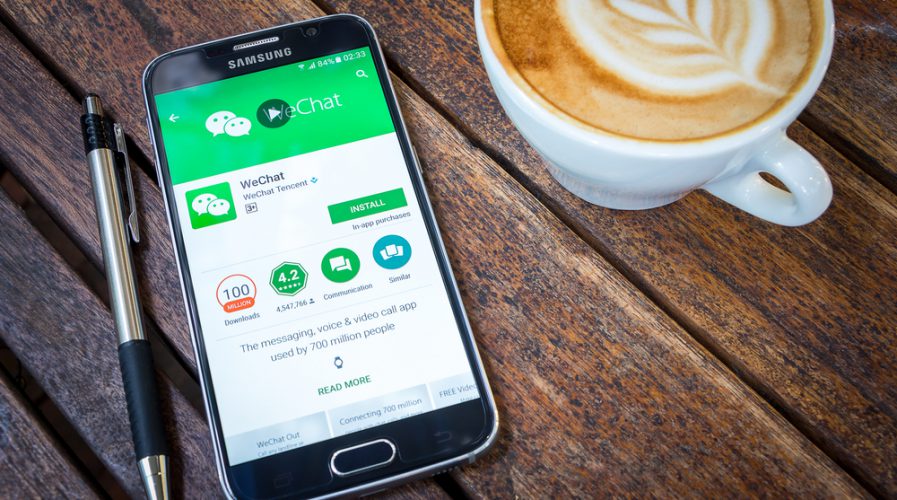
WeChat has rolled out a ‘Mini Programs’ system in its bid to become an omni-app. Pic: Chonlachai/Shutterstock
WeChat’s ‘mini app’ system could revolutionize the way we interact with apps
OVER the past week, China’s WeChat launched a brand new “mini app” system that has been hailed as a game-changer in the app store space. The effort could shake the industry up considerably, and also become a potential threat to brands like Apple or Google’s Android.
WeChat is China’s top messaging app and boasts over 850 million users, giving it a huge platform to introduce the new system. All the mini apps can be accessed only within the WeChat main app, but eliminates the need to download, install, and set up an account in order to use them.
TechNode described the system as “light and easy”, taking less than a minute to find a mini app, access it and use it right away. The system, which has no formal name, was announced in September last year and launched on Monday.
Ten years after the launch of iPhone, WeChat Mini Programs officially launches. And what a change to the idea of "downloading" apps. pic.twitter.com/8DWSH4zFMD
— Connie Chan (@conniechan) January 8, 2017
One noteable change is that WeChat calls the apps ‘Mini Programs’, reportedly to avoid conflict with Apple and Android app stores.
The mini apps function as a stripped down version of their parent app. For example, TechNode found that the Didi mini app only allows users to hail a car, and doesn’t have the other functions the regular app offers.
The mini apps were built by both major brands like Didi, as well as smaller enterprises and startups. They come across as a small taster for WeChat users, who can test out the mini app and then decide whether or not downloading the full version is worthwhile.
SEE ALSO: WeChat introduces identity card feature to become ultimate ‘one-stop-shop’ app
But by first changing the way 850 million people use and engage with apps, WeChat is achieving its ambition to become a one-stop-shop app that has everything. It’s already established itself as far more than just a messaging app, and now the Tencent-owned social platform is taking itself one step further.
A Nielsen study found that 85 percent of consumers’ time is spent browsing apps on their mobile phones, but this doesn’t mean these apps can capture and retain attention. But WeChat stands to become an omni-app of sorts with these new features – you never really have to leave it.
This, of course, poses a threat to Apple’s App Store and Google Play, which houses Android apps. By eliminating the need to download and install individual apps, WeChat bypasses these two powerhouses and in one fell swoop, could be well on its way to making them obsolete.
WeChat’s system also helps developers that already use official accounts and chatbots on the platform by providing them with an avenue to give users a richer experience with what they have to offer.
"With mini programs #WeChat has transitioned into #China's first device neutral #mobile operating system." https://t.co/z4TkWItYsZ
— Michelle Wonderland (@ThingstoDoInSG) January 11, 2017
According to Tech in Asia, WeChat isn’t the only threat to app stores – Facebook is also trying to roll out more features including games in Messenger, as well as chatbots, which are expected to be quite impressive once Facebook’s artificial intelligence technology is kicked into high gear.
In November last year, Apple did a huge spring clean on the App Store, removing 47,300 outdated and unmaintained iOS apps. About 28 percent of the apps removed were said to include games. Keeping the App Store up to date is important, but it’s not enough to level with WeChat’s arsenal of apps and features.
One of the ways in which Apple could improve its App Store is to make it friendlier for developers, who often cite frustration at the fact that the Store has been barely updated in five years.
The WeChat team will encourage devs to create Mini Programs that are activated via QR codes. Location-based & contextual. #wechatconference
— Eva Xiao (@evawxiao) December 28, 2016
According to MakeUseOf, an educational technology website, developers face issues such as technical limitations imposed by Mac App Store guidelines, lacking in app analytics, and unaddressed bugs – all while taking a 30 percent cut from the app’s sales.
If Apple were to seriously address these problems and create a more streamlined process for developers and users alike, it could possibly compete with WeChat. However, that remains to be seen.
READ MORE
- The criticality of endpoint management in cybersecurity and operations
- Ethical AI: The renewed importance of safeguarding data and customer privacy in Generative AI applications
- How Japan balances AI-driven opportunities with cybersecurity needs
- Deploying SASE: Benchmarking your approach
- Insurance everywhere all at once: the digital transformation of the APAC insurance industry
